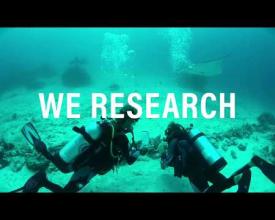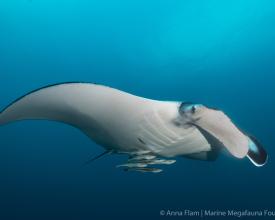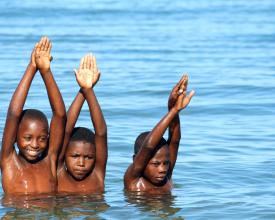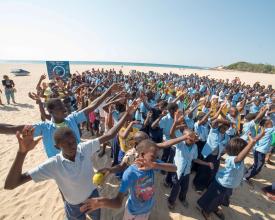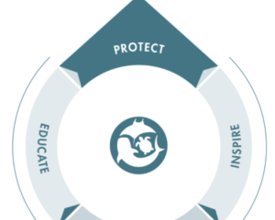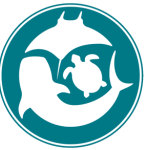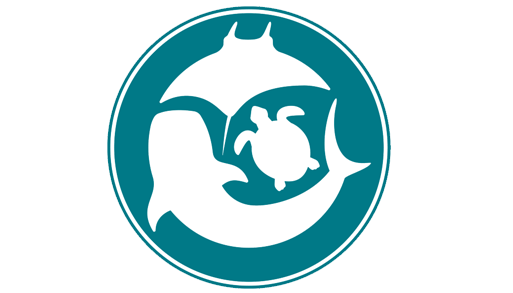Sustainable Seas: Addressing destructive fishing practices in the Inhambane Province, Mozambique
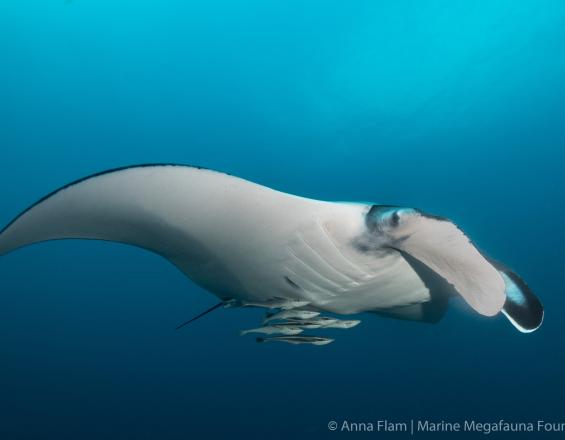
Mozambique's ocean is home to precious marine biodiversity and Inhambane province is one of the few places where you can find whale sharks and manta rays year-round. Artisanal fisheries and tourism are critical to the economy of the country, yet both are threatened by persistent, destructive fishing practices. To address this threat Marine Megafauna Foundation (MMF) tackles the root causes by educating and empowering local communities to manage their marine resources sustainably through innovative education, pioneering research and community empowerment.
MMF Sustainable Seas Project is creating an effective network of Locally Managed Marine Areas along Inhambane’s coast, with sustainable fishing activity throughout the most bio-diverse waters. Improved scientific knowledge of key species and fisheries combined with responsible marine resource management mitigate threats to vulnerable species helping communities to protect their valuable natural resources.
Context
Challenges addressed
-
Establish consensus on the restructuring of the Community Fisheries Council (CCP) in Tofo, and therefore little progress towards the implementation of Locally Marine Managed Areas (LMMAs).
-
Difficulty in establishing consensus between neighboring communities that fish in the same location when one decided to implement an LMMA.
-
Lack of awareness of the new Fisheries Regulation (REPMAR) in the communities, and weak law enforcement by the Government, and therefore by the community itself.
-
Limited understanding of the existence and benefits of LMMAs by fishermen, lack of training on LMMA management, lack of management structures.
-
Poor participation of many community members in decision-making meetings, which led to disagreements on LMMAs in Barra.
-
COVID-19 limited communication with the communities, which delayed the project activities from 2020.
Location
Process
Summary of the process
Communities are fully engaged in the management of their resources, as they formally manage their marine areas, the LMMAs. They are supported in doing so, through their involvement in alternative livelihoods development, community associations and education. The Ocean ambassadors act as local champions who strengthen community awareness raising and engagement among their peers.
Building Blocks
Four fishing communities successfully managing LMMAs along the Inhambane coast.
With the creation of an effective network of Locally Managed Marine Areas (LMMAs) along Inhambane´s coast and sustainable fishing activity throughout the most bio-diverse waters, MMF aims to mitigate threats to vulnerable species.
Community activities were succesfully achieved through monitoring the conservation outcomes and threats and preventing destructive fishing activities (Tofo, Barra, Rocha, Morrungulo).
Enabling factors
To achieve the proposed goals were crutial:
- Training workshops for CCP, leaders, coastal police and fishermen on marine resource management and LMMAs
- Establishing LMMAs and reef closures through consensus building, engagement with local, provincial and national authorities, scientific advice and implementation support.
- Developing marine management plans with communities.
Lesson learned
Through conservation and better management of marine resources, especially megafauna, all coastal communities in the project areas will indirectly benefit from sustained income from fishing and tourism businesses.
A network of passionate and influential Ocean Ambassadors and Ocean Guardians from five communities
With the objective to advocate for sustainable fishing practices and protection of their marine ecosystem (Tofo, Barra, Rocha, Morrungulo, Bazaruto), the organisation will also help communities to protect their valuable natural resources for future generations, supported by improved scientific knowledge of keystone species and fisheries, responsible marine resource management and alternative livelihoods and a creation of a network of Ocean Ambassadors and Guardians raised to cherish their waters.
Enabling factors
To build on this, we have established our pilot Coral Reef Club. This club targets 16-21 year-olds who have graduated from our Nemos Pequenos programme and provides these young adults with capacity building and life skills opportunities. Already extremely popular, it serves two very important functions in the community, by providing: 1) ongoing marine conservation education and, 2) support in finding livelihoods (other than fishing) through vocational internships with local businesses and employment skills.
Lesson learned
We need to scale up our efforts and build on our initial successes. We want to deepen our research into why marine megafauna are in rapid decline, continue to raise the Ocean Ambassadors and Guardians of the future and increase the reach of our conservation efforts along the coastline.
Community engagement through empowering activities
In order to ensure sustainability and long-term effectiveness, those areas are managed by the community, alongside with:
- Development of a sustainable fish consumer guide for restaurants and tourists through research on sustainable fish, fishing practices, fish supply chains and demand
- Establishment of 5 livelihood associations such as VSLAs
- Feasibility study for the development of sustainable fishing cooperatives
- Training and equipment of fishermen as Ocean Rangers to monitor fishing practices.
These activities have resulted in the reduction of destructive, indiscriminate artisanal fishing methods and over-fishing in four fishing communities in order to reduce unsustainable pressure on fish stocks and the catch of vulnerable species (Tofo, Barra, Rocha, Morrungulo and potentially Bazaruto).
Enabling factors
Communities are empowered through the management of their marine areas and through education activities, as well as improved livelihoods. They engage therefore in safeguarding their resources, instead of using destructive fishing methods.
Lesson learned
- Identifying and supporting other forms of alternative livelihoods for fisher households help to reduce their reliance on destructive fishing methods and reduce the impact of reef closures on the economic status and food security of their families.
- Social mobilization and awareness raising are instrumental in building pressure for change in behavior and practices at the local and provincial level.
Impacts
-
Two successful temporary reef closures managed by the local CCP
-
A stronger and more empowered CCP
-
Engagement of the local government authorities in LMMA discussions
-
37 local Ocean Ambassadors
-
600 community members taking part in awareness raising activities organised and supported by Ocean Ambassadors
-
8 women from fisher households assisted to start-up their own successful ecotourism business, 2 fisher households with a diversified asset/income base and 3 fishermen placed in apprenticeship positions.
-
116 community members in 6 active VLSA programs
-
Commencement of our reef fish monitoring project. In November 2017 and March 2018, we carried out monitoring on 5 reefs in Tofo and completed a total of 148 transects.
-
Three successful Mozambican research fellow taught to swim, SCUBA dive and take part in reef monitoring, contribute to scientific papers and interact with policy makers
-
Almost daily monitoring of megafauna sightings, and a database with 10 years of information on sightings, environmental conditions and fishing activities
-
Publication of scientific papers by key MMF researchers, which contributed to the increased protection status of whale sharks from vulnerable to endangered on the IUCN Red List in 2016
-
Research on the contribution of manta ray tourism to the Mozambican economy in 2016
-
A significant improvement in artisanal fishing methods
Beneficiaries
Total Direct Beneficiaries: 10,171 persons
-
Local leaders and fishers trained in marine conservation and LMMAs
-
Children benefiting from marine conservation, swimming and water safety lessons
Total Indirect Beneficiaries: 32,000 persons
Sustainable Development Goals
Story
Thanks to the unique environmental conditions, the plankton rich waters off the Inhambane Province in Mozambique are a critical hotspot for over 30 vulnerable and endangered elasmobranch species, including whale sharks and manta rays. However, since 2005, MMF has documented a 98% and 79% decline in manta ray and whale shark sightings respectively, with accidental by-catch from artisanal fishing as a predominant threat to their existence.
MMF has witnessed the devastating impact of gill nets and other destructive fishing methods. However, fishing is a fundamental livelihood and source of food. The waters around Mozambique are over-fished and it is becoming increasingly difficult to sustain artisanal fisheries. Over-fishing, lack of management, and high demand is driving more destructive methods. This includes leaving gill nets out for long periods, using small mesh drag-nets, intensive spear fishing, and over-fishing on shallow reefs which act as fish nurseries. Community Fishing Councils are present, but their activities are limited by a lack of resources, lack of knowledge and competing demands between different stakeholders. Marine tourism is also an important source of employment in Inhambane, with manta ray tourism alone bringing in USD 34 million a year to the country. But this important source of revenue is threatened. This project addresses threats to marine megafauna, while concurrently working to reduce the impact of over-fishing on poverty and natural resource preservation. Our primary focus is on the attainment of the SDG 14. Also, this project contibutes to SDG 1, 2, 8, and 12.
MMF’s founders have been active in Mozambique since 2005 conducting research on manta rays and whale sharks. Both founders play important roles at the global level in the protection of these gentle giants though the IUCN’s Red List assessments and the IUCN Shark Specialist Group. MMF was established in Tofo, Inhambane Province in 2009.
Our work on community-led sustainable fisheries began in Tofo in 2016 where we successfully coordinated their first ocean reef closure. MMF is recognized and respected at the national level and was invited to take part in the development of a national plan of action for shark and ray conservation.

